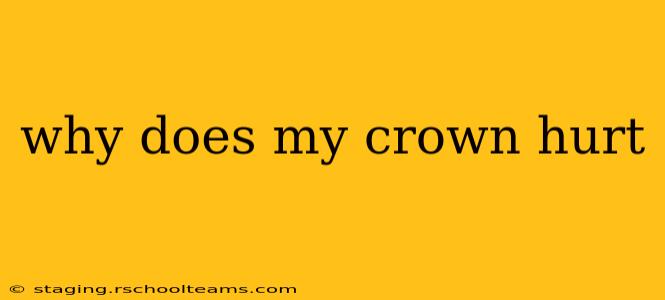Dental crowns are a common restorative treatment, designed to protect and strengthen damaged teeth. However, sometimes a crown can cause discomfort or even pain. Understanding the potential causes is crucial for addressing the issue and preventing further problems. This article will explore the various reasons why you might experience crown pain, offering insights into potential solutions and when you should seek professional dental care.
What are the Common Causes of Crown Pain?
Several factors can contribute to pain originating from a dental crown. Let's explore some of the most frequent culprits:
1. Irritation or Infection Under the Crown:
This is perhaps the most common reason for crown pain. Bacteria can seep under the crown, leading to inflammation and infection of the underlying tooth structure (pulpitis or periapical abscess). Symptoms may include throbbing pain, sensitivity to pressure, or swelling in the gums surrounding the crown.
2. Tooth Decay:
Even with a crown in place, decay can still occur, especially around the margins where the crown meets the tooth. This decay can cause pain, sensitivity to temperature changes (hot and cold), and eventually lead to more serious problems.
3. Damaged or Loose Crown:
A cracked or loose crown can cause pain due to the exposed dentin and enamel beneath. This may be accompanied by a feeling that the crown is loose or shifting when you bite down.
4. Gum Disease:
Gingivitis or periodontitis (gum disease) can cause inflammation and infection around the crown, leading to pain and discomfort. Poor oral hygiene is a major contributing factor to gum disease.
5. Sinus Infection:
Pain originating from a sinus infection can sometimes be referred to the teeth, particularly the upper molars. This pain might feel like it's coming from your crown, but the underlying cause is unrelated to the crown itself.
6. Trauma to the Tooth or Crown:
A blow to the mouth or accidentally biting down on a hard object can damage the underlying tooth or the crown itself, leading to pain.
7. Bite Problems (Malocclusion):
An improper bite can cause excessive pressure on the crown, leading to discomfort or pain. This often involves the crown being higher than the opposing tooth.
What Should I Do If My Crown Hurts?
If you are experiencing pain related to your dental crown, contact your dentist immediately. Delaying treatment can worsen the problem and may lead to more extensive and costly procedures. Your dentist will be able to:
- Diagnose the cause of the pain: A thorough examination, including X-rays, is necessary to identify the underlying issue.
- Develop a treatment plan: Treatment may range from a simple adjustment to the crown to more complex procedures such as root canal therapy or crown replacement.
- Provide pain relief: Your dentist may prescribe medication to manage pain and inflammation while addressing the underlying cause.
How Can I Prevent Crown Pain?
Maintaining good oral hygiene is essential for preventing crown pain and other dental problems. This includes:
- Brushing twice daily: Use fluoride toothpaste and a soft-bristled brush.
- Flossing daily: Remove food particles and plaque from between your teeth.
- Regular dental checkups: Professional cleanings and examinations can help identify potential problems early on.
- Avoiding hard foods: This can help prevent damage to the crown or underlying tooth.
- Protecting your teeth: Wear a mouthguard during sports or activities that could cause trauma to the mouth.
Remember, prompt attention to any pain associated with your dental crown is vital. Ignoring the problem can lead to more significant dental issues and increased discomfort. Don't hesitate to reach out to your dentist for help.
